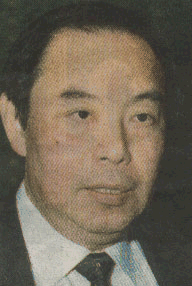An intellectual par excellence
Dato' Dzulkifli Abd Razak
Article
The New Sunday Times - 09/03/2006
IT not often that a young nation like Malaysia is blessed with a gentleman, an intellectual, a thinker and a scholar par excellence, all wrapped up in one.
Even then, the nation could never have enough of his services. Tan Sri Dr Noordin Sopiee passed away last year at the age of 61, after battling cancer for several months.
Article
The New Sunday Times - 09/03/2006
IT not often that a young nation like Malaysia is blessed with a gentleman, an intellectual, a thinker and a scholar par excellence, all wrapped up in one.
Even then, the nation could never have enough of his services. Tan Sri Dr Noordin Sopiee passed away last year at the age of 61, after battling cancer for several months.

Universiti Sains Malaysia will house The Noordin Sopiee Chair for Global Studies to be launched tomorrow by Prime Minister Datuk Seri Abdullah Ahmad Badawi.
But like all national heroes, more so the intellectual ones, there are not enough of them. Noordin will be remembered for a variety of reasons.
In his various capacities, as a Press person at the New Straits Times Press to the helm of the Institute of Strategic and International Studies (ISIS), Noordin left his mark.
Starting out as a journalist, he rose to became group editor of the New Straits Times in the late 1970s.
A prolific writer and thinker, the job suited him well, going big into investigative journalism and features, as well as introducing a complaints service, all of which created an impact on readers.
Noordin had always an interesting viewpoint on "big issues" that set others thinking on what he wrote.
His colleague and current chairperson and chief executive officer of ISIS describes him as "a wordsmith with a flair for a fine turn of phrase".
Noordin read Political Science and International Selations at the London School of Economics.
As secretary-general of the London Union of Malaysian Students, he organised demonstrations in the streets of London against Indonesian aggression during Confrontation.
As a director-general of ISIS, Noordin made many crucial contributions, no less to the national blueprint, Vision 2020, an effort he regarded as "intellectually assembled in a single document the economic reforms of the last 10 years which have restructured and transformed the Malaysian consensus".
Noordin once said that "Malaysia has always been a prime candidate for the dustbin of history", given our heterogeneity. He reasoned we should in theory have become a "Lebanon" long before Lebanon became a "Lebanon".
Hence, the first objective of Vision 2020 is to become "a united Malaysian nation with a sense of common and shared destiny. This must be a nation at peace with itself, territorially and ethnically integrated, living in harmony and full and fair partnership, made up of one Bangsa Malaysia with potential loyalty and dedication to the nation".
Noordin recognised that this is the most difficult quantum leap that we must make over the years.
Noordin contended that all drafts must be subjected to the "30-second rule". He insisted that if a 10-year-old boy or grandmother cannot articulate the country's vision in 30 seconds, the planners should go back to the drawing board.
Such is the passion of a person who truly loved his country.
Many will vividly remember his full-page open letter to newspapers in November 1998, protesting the then US vice-president’s unbecoming behaviour at the dinner of the Asia Pacific Economic Co-operation (Apec) Forum in Kuala Lumpur.
The US Government had also kept the elaborate pretence that the US president would be coming when they had no intention of having him in Kuala Lumpur for the Forum.
Needless to say, this global Malaysian is set to defy the Malay proverb patah tumbuh, hilang berganti (loss is not permanent) for a very long time to come.
One can never pay enough tribute to Noordin for his immense contributions to the nation and the intellectual world.
He was an inspiration whose legacy will remain as the nation blossoms.
